A
Auto Express
Guest
The Volkswagen ID.3 is an accomplished all-electric family hatchback. It gets the basics right with competitive pricing, desirable looks and great levels of comfort - all wrapped up in a practical package with a usable, real-world range.
On-board tech is also a plus point, but the touch-sensitive infotainment screen could divide opinion and some might find the harder interior plastics slightly disappointing. Nonetheless, the ID.3 is an outstanding electric car and stands apart from its less-proficient rivals.
Volkswagen has introduced the all-electric ID.3 to spearhead the company’s move away from fossil fuels and into a new emissions-free era. The five-door hatchback is the German car maker’s first battery-electric model from what is to be a family of ID-badged cars and VW hopes that it can become an automotive icon like the original Beetle and Golf before it.
The iconic style and practicality of the Golf has set the standard for premium hatches over the past few decades, so the ID.3 cannot simply trade on its green credentials alone. It still has to deliver in the areas that matter most to customers - providing good value for money, while maintaining the levels of quality and reliability the manufacturer has built its reputation on. Has the ID.3 succeeded?
The short answer is, yes, it most definitely has. Practicality and passenger space are both up to standard. There are superior levels of comfort and refinement, while the latest on-board tech and generous standard equipment mean that the case for choosing an ID.3 is pretty compelling.
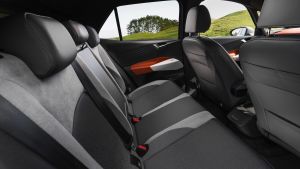
image
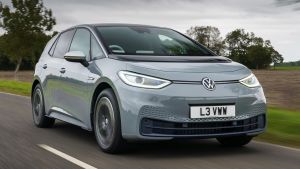
image
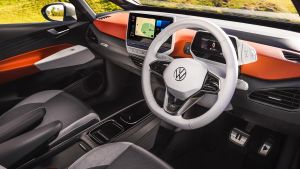
image
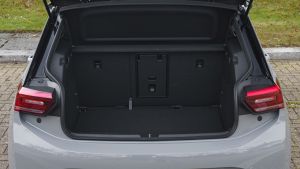
image
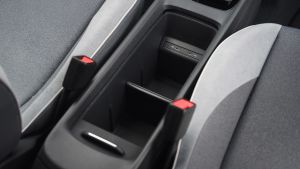
image
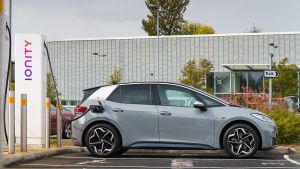
image
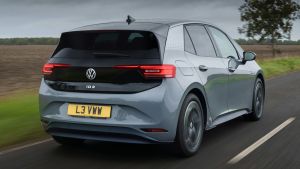
image
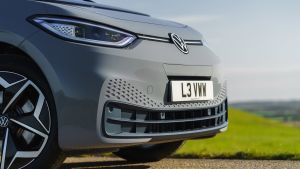
image
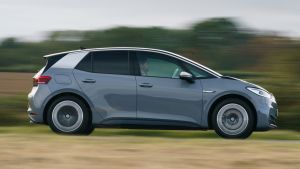
image
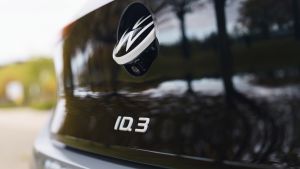
image
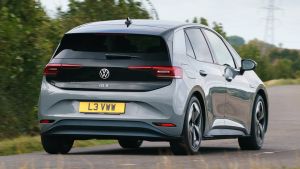
image
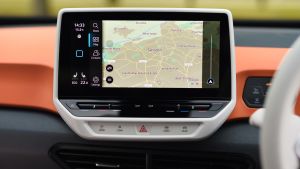
image
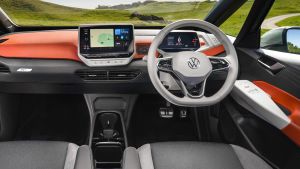
image
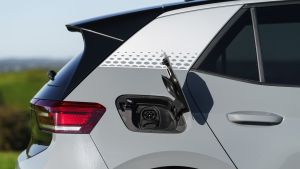
image
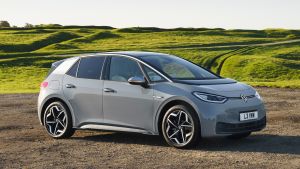
image
As an electric five-door family hatchback, a little bigger than a Golf, the ID.3 pulls its rivals from various sectors of the market. Buyers of traditional petrol, diesel or hybrid hatches like the Golf, Ford Focus or Toyota Corolla might be tempted.
Alternatively, those set on an electric car will be considering models like the similarly-sized Nissan Leaf or the smaller Renault Zoe supermini. There’s also a raft of electric SUVs for similar money, most notably the impressive Kia e-Niro and Hyundai Kona Electric.
Finally, higher-spec versions of the ID.3 push towards the Tesla Model 3 in price, where customers may be persuaded by the US car’s extra size, pace and high-end image.
Despite the ID.3’s hefty weight of around 1,700kg, its 201bhp electric motor provides more than enough power to make swift progress and, of course, there’s the typical instant acceleration that comes with pure electric drive.
Three battery sizes will be on offer for the ID.3; the mid-spec 58kWh version is initially available for most cars, providing around 260 miles of range. The biggest 77kWh variant is included in the top-of-the-range model, while the entry-level 45kWh battery will be added from 2021.
Volkswagen calls the 58kWh battery and 201bhp motor set-up, Pro Performance, and offers it with a choice of no fewer than seven individual trim levels - Life, Style, Business, Family, 1st Edition, Tech and Max. The 77kWh version is named Pro S and is only available with the top-of-the-range Tour specification.
Each trim level comes pre-fitted with a range of different equipment packs and additional ‘Plus’ variants which add to the generous roster of kit.
Continue reading...
On-board tech is also a plus point, but the touch-sensitive infotainment screen could divide opinion and some might find the harder interior plastics slightly disappointing. Nonetheless, the ID.3 is an outstanding electric car and stands apart from its less-proficient rivals.
About the Volkswagen ID.3
Volkswagen has introduced the all-electric ID.3 to spearhead the company’s move away from fossil fuels and into a new emissions-free era. The five-door hatchback is the German car maker’s first battery-electric model from what is to be a family of ID-badged cars and VW hopes that it can become an automotive icon like the original Beetle and Golf before it.
The iconic style and practicality of the Golf has set the standard for premium hatches over the past few decades, so the ID.3 cannot simply trade on its green credentials alone. It still has to deliver in the areas that matter most to customers - providing good value for money, while maintaining the levels of quality and reliability the manufacturer has built its reputation on. Has the ID.3 succeeded?
The short answer is, yes, it most definitely has. Practicality and passenger space are both up to standard. There are superior levels of comfort and refinement, while the latest on-board tech and generous standard equipment mean that the case for choosing an ID.3 is pretty compelling.

image

image

image

image

image

image

image

image

image

image

image

image

image

image

image
As an electric five-door family hatchback, a little bigger than a Golf, the ID.3 pulls its rivals from various sectors of the market. Buyers of traditional petrol, diesel or hybrid hatches like the Golf, Ford Focus or Toyota Corolla might be tempted.
Alternatively, those set on an electric car will be considering models like the similarly-sized Nissan Leaf or the smaller Renault Zoe supermini. There’s also a raft of electric SUVs for similar money, most notably the impressive Kia e-Niro and Hyundai Kona Electric.
Finally, higher-spec versions of the ID.3 push towards the Tesla Model 3 in price, where customers may be persuaded by the US car’s extra size, pace and high-end image.
Despite the ID.3’s hefty weight of around 1,700kg, its 201bhp electric motor provides more than enough power to make swift progress and, of course, there’s the typical instant acceleration that comes with pure electric drive.
Three battery sizes will be on offer for the ID.3; the mid-spec 58kWh version is initially available for most cars, providing around 260 miles of range. The biggest 77kWh variant is included in the top-of-the-range model, while the entry-level 45kWh battery will be added from 2021.
Volkswagen calls the 58kWh battery and 201bhp motor set-up, Pro Performance, and offers it with a choice of no fewer than seven individual trim levels - Life, Style, Business, Family, 1st Edition, Tech and Max. The 77kWh version is named Pro S and is only available with the top-of-the-range Tour specification.
Each trim level comes pre-fitted with a range of different equipment packs and additional ‘Plus’ variants which add to the generous roster of kit.
Continue reading...
